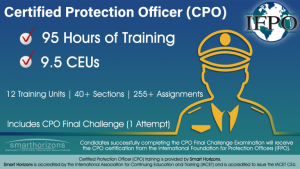More businesses are requiring proof of training these days, a result of a threat landscape that is increasingly sophisticated and global, according to Dan Mendelson in Securing the Best: Raising the Bar with IFPO Certification.
"It’s the biggest change I’ve seen,” IFPO Executive Director Sandi Davies said about the demand. As a third party, IFPO is an authority that can validate whether or not those officers have proper training. “Businesses that contract out are writing into the bid specifications that there is a requirement of an IFPO certification for new hires.”
That said, here are 10 reasons why you should become a Certified Protection Officer with the IFPO:
1. The CPO certification will accelerate your career as a security professional.
2. You will better understand your scope of responsibility.
3. You will gain detailed knowledge and an in-depth understanding of the role and responsibilities of a protection officer, including legal obligations, personal liabilities and expected duties.
4. You will improve your confidence and effectiveness in an entry level management position.
5. You will gain the ability to lead and plan more strategically, identifying threats and exploring new opportunities to reduce crime and losses.
6. It gives you credibility, knowledge, professionalism and ethics.
7. Certification will expand your career options, provide job security and career advancement.
8. Certification is not just career development, it’s also personal development.
9. An educated security professional helps their organization reduce and mitigate vulnerabilities.
10. Certifications are investments in your future.
Interested? Click here to order!
Units of study include topics such as:
-- Career Planning for Protection Professionals
-- Crisis Intervention
-- The Protection Officer as a Leader
-- Security Risk Management
-- Effective Communications
-- Antiterrorism and VIP Protection
-- Security Awareness
-- Crime and Incident Scene Procedures
-- Automation in Protection Operations
-- Interviewing and Statements
-- Patrol Principles
-- Legal Aspects of Security
-- Environmental Crime Control
-- Use of Force
-- Alarm System Fundamentals
-- Defensive Tactics and Officer Safety
-- Occupational Safety and Health and the Protection Officer
-- Apprehension and Detention Procedures
-- An All Hazards Approach to Hazardous Materials
-- Human Relations in a Global Environment
-- Information Security and Counterintelligence
-- Ethics and Professionalism
-- Workplace Crime and Deviance
-- And much more



